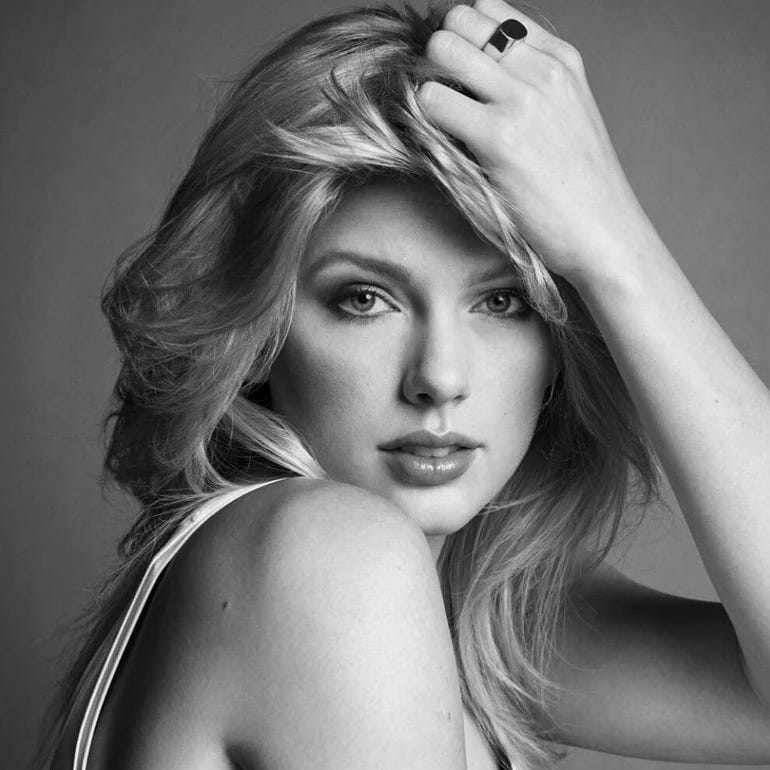Taylor Swift is an important poet
It's her electrifying skill as a writer that sets her apart
I recently underwent a surgical procedure that according to the female Scottish surgeon who performed it would cause either no discomfort at all or result in 'exceptional pain' for at least two weeks. No way to tell until I was on the operating table, apparently. She said this matter-of-factly, as if discussing bus routes, just as I was about to receive a general anaesthetic. As soon as I came to, I learned it was the latter.
In the following days, bedbound and near-delirious with pain and medication, I listened to hour after hour of Taylor Swift. I didn't want to hear anything else. I found her music, with its vast emotional depth and stunning lyrical dexterity, terrifically soothing.
Surely the music we turn to in distress, when we really need it, says more about our tastes and who we are than the songs we listen to when we're happy or indifferent. Lying there mewing and terrified of movement, my other favourite bands - The Smiths, The Libertines, The National, The Strokes - were no use at all. I needed Swift, and only Swift would do.
Until very recently, I'd been quite furtive about my Taylor Swift habit. I knew I was verging into superfan territory when Spotify sent me my listening statistics for 2022, which informed me I was in the top one percent of her global listeners. I was secretly quite proud of the achievement - there's a lot of Swifties in the world, after all. But I didn't make a thing of it, mainly because I feared I would be mocked. It was widely accepted, I thought, that Swift's music was for teenage girls, not men fast closing in on 50.
But lately I feel more prepared to be open about how I feel. I'm a Taylor Swift obsessive, and I don't care who knows it.
What's changed? Well, for one thing I've noticed I'm not alone among heterosexual men of my age. Chatting to a couple of school dads at my children’s sports day last month - as chance would have it on the same day Swift announced she would be touring the UK next year - all of us professed first to a desire to obtain tickets (for our wives and daughters, you understand), and then to the fact we were clandestine fans. 'She's relevant', one said knowingly, and we all frowned and nodded in unison.
The collaborations she's done since the pandemic with members of the unimpeachably cool band The National also don't hurt when it comes to expressing admiration for Swift in public when you're my age. If she's cool enough for lead singer Matt Berninger - a deeply cool 52 year-old - then the reality is she's probably cool enough for you, too.
But the main reason I now don't mind who knows I think Swift is the most important female musical artist of all time is the sheer weight of the evidence. Ignore the fact Shake It Off is unarguably the greatest pop song ever written or the astonishing range of her back catalogue, and look instead at the records she is breaking with her current box office-melting, 131-date Eras tour, which sees her playing back-to-back three-hour sets in sold out stadiums on five continents.
On the first day tickets went on sale in America alone, a record 2.6 million were shifted. By the time the tour concludes in August next year, it will have generated profits well in excess of $1.5 billion - far more than any other artist has ever achieved.
Yes, at face value Swift is just another big league pop star - a beautiful face who can hold a note and dance. But it's her electrifying skill as a writer that truly sets her apart and that creates such a powerful connection with so many people. As anyone who has listened properly to her lyrics will attest, she's a poet, and an important one at that. 'There's an ache in you, put there by the ache in me', she sings on tis the damn season, by my reckoning casually distilling in just twelve words the complex sentiment every love poem or love song ever written in the history of our species has been trying to communicate.
On You Are In Love she goes further, describing the indescribable sensation of being in love as well as anyone ever has: 'You can hear it in the silence. You can feel it on the way home. You can see it with the lights out', she sings.
There are moments of perfectly expressed human insight in virtually all Taylor Swift songs, but it's the ten minute version of All Too Well that's her crowning masterpiece. A deeply moving disquisition on spurned love addressed a decade after the event to the older lover who broke her heart as she turned 21, it builds to an impossibly sad conclusion. 'Just between us, did the love affair maim you too?' she sings hauntingly towards its end. This isn't just music for teeny-boppers.
I don't believe I'll stand a prayer of getting tickets to see her perform on my birthday at Wembley Stadium next June, because as soon as they go on sale next week hundreds of thousands of people will attempt to buy them and I'm not prepared to pay the thousand pounds that secondary ticket sites are apparently demanding.
Instead I'll wait for the live recording to appear on Netflix, which I'll enjoy painlessly on my sofa with a bottle of wine. On top of everything else, I've come to believe listening to Taylor Swift has medicinal qualities. I was promised a fortnight of agony by my surgeon, but in reality it lasted only a week. For that - and for everything else - thank you, Taylor.
This article was originally published in the Spectator.


